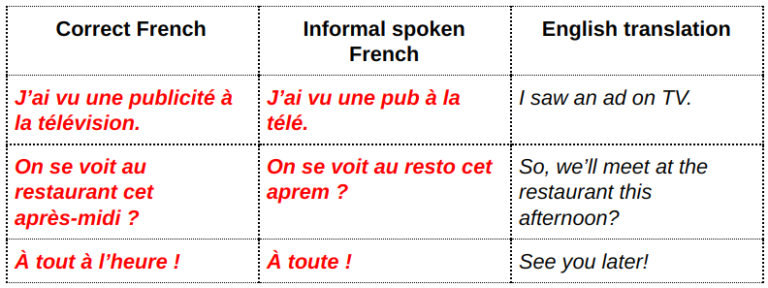
Want all the vocabulary of the lesson ?
Just like in English, some words get cut down in everyday French!
Let’s see how you can get to understand the most common ones – so you can better speak and understand spoken French.
1) Cutting words: le p’tit-dej bio
Le petit-déjeuner (= breakfast) is often pronounced “le p’tit-dej”.
Often, the “e” gets cut in everyday spoken French.
Like “petit” (= small) being pronounced “p’tit” (with a silent final “t” and no “e”.)
We cut the end of the long word “déjeuner” (= a lunch, or a meal), and it makes “dèj.”
And if you’re having breakfast with only organic products, it becomes un p’tit dèj bio. In stores and labels, bio is short for “issu de l’agriculture biologique” (= comes from organic farming and practices, that didn’t use pest control chemicals. = organic.)
2) Cutting words: Other common nouns
- Une publicité (= an advertisement) → une pub (= an ad)
- La télévision → La télé (= TV, telly)
- Un professeur → Un prof (= a teacher)
- Le restaurant → Le resto / Le restau (= a restaurant)
- L’après-midi → L’aprem (= the afternoon)
- Un réfrigérateur / un Frigidaire (= a refrigerator) → Un frigo (= a fridge)
- Un appartement → Un appart (= a flat – with a “t” sound at the end!)
Note that:
– Yes, une pub in French is an ad, and a feminine noun. It’s not un bar (= “a pub”) at all !
– Après-midi is a fun word; it can be masculine or feminine. Un après-midi and une après-midi are both correct!
– Un Frigidaire is technically a brand name, but it’s often used as a general noun for fridges anyway.
3) Cutting words: Test yourself with sentences
Here are three French sentences. ? What would be their “not-cut” version?
What do they mean?
- J’ai vu une publicité à la télévision.
- On se voit au restaurant cet après-midi ?
- Il a un bon appartement.
Answers: (Do take the time to try out finding them yourself first!)
- J’ai vu une pub à la télé. → I saw an ad on TV.
- On se voit au resto cet aprem ? → Shall we meet at the restaurant this afternoon?
- Il a un bon appart. → He’s got a nice flat.
4) Cutting words: Expressions
Some everyday expressions also get shortened, in fast, informal spoken French!
- Il y a (= there is) → “Ya”
- Bon appétit ! (= Enjoy your meal) → “Bon app’!”
- Comme d’habitude (= As usual, as per usual) → “Comme d’hab”
- À tout à l’heure. (= See you later) → “À toute.”
- À plus tard. (= See you later) → “À plus !”
And now you can use and understand everyday shortcuts for French words ! Congrats! 🎉🎉🎉
Dive deeper into:
- French Grammar: How to say “Plus”
- French Grammar: 5 Easy Expressions the French use (and you can too)
- Spoken French Essentials: Cutting the “e”
À tout de suite.
I’ll see you in the next video!
→ If you enjoyed this lesson (and/or learned something new) – why not share this lesson with a francophile friend? You can talk about it afterwards! You’ll learn much more if you have social support from your friends 🙂
→ Double your Frenchness! Get my 10-day “Everyday French Crash Course” and learn more spoken French for free. Students love it! Start now and you’ll get Lesson 01 right in your inbox, straight away.
Click here to sign up for my FREE Everyday French Crash Course

Merci beaucoup Géraldine c’est très utile
Bonne journée Anne
Hi Géraldine,
You are the teacher who introduced me to the “quirky disconnect” between spoken and written language. Your YT video titled “Fast Spoken French” changed my language-learning life ! Je serai reconnaissante éternellement.
In this week’s video you say native French speakers have a habit of cutting words and not enunciating, “unlike in English or Spanish…”.?????
“Yunno” these phenomena DO exist in spades in English. In a “convo” with my “buds”
I would say “I dunno.Whaddya think?” but I would write “I don’t know.What do you think?”
Affirming that languages DO have this in common helps to grasp this essential teaching.
À tout,
Shannon
Thank you so much for this, Géraldine. I have a little question: is there any subtle difference between the meanings of ‘à tout à l’heure’ and ‘à plus tard’? Or do they both simply mean ‘See you later’?
Bonjour,
Very good question, indeed!
à tout à l’heure = you will be back in a few minutes or a few hours (same day).
à plus tard = you hope to meet again on the same day in general.
à la prochaine = you hope you will meet again but do not know when.
I hope this helps.
Fabien
Comme Une Française Team
Salut, Gér. Peut-on raccourcir votre prénom dans cette mode du français parlé ? Ne soyez pas offencé, s’il vous plaît. Je ressens les gens, pas seulement les vois. Donc, je crois que vous avez un excellent sens de l’humour et que vous ne me chasserez pas de votre session hebdomadaire.
Thank you Geraldine. These tips are most useful in helping me understand some of the great French series on Netflix. They speak so fast their French seems almost impossible to understand. I am enjoying l’ Agence at the moment with its informal family chats! Your tips will help. À toute!
The thing that makes understanding spoken French even more challenging is also the insane amount of homophones. Foi/foie/fois/Foix, cent/s’en/sent, comte/conte/compte, la/là/l’a/l’as, quand/quant/qu’en, tant/temps/taon, soi/soie/soit, cour/cours/court just to name a few!
Exactement! La langue est presque impossible!
…and vers/vert/verre/ver…